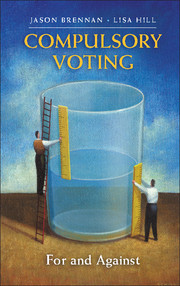Book contents
- Frontmatter
- Contents
- Acknowledgments
- Part I Medicine Worse Than the Disease?
- Part II Compulsory Voting Defended
- 5 Compulsory Voting: Background, Effects, Feasibility, and Basic Premises
- 6 Turnout, Abstention, and Democratic Legitimacy
- 7 Is Compulsory Voting an Unjustified Burden on Personal Autonomy?
- 8 Is Requiring People to Vote Contrary to Democratic Values?
- 9 Conclusion
- Bibliography
- Index
- References
9 - Conclusion
Published online by Cambridge University Press: 05 June 2014
- Frontmatter
- Contents
- Acknowledgments
- Part I Medicine Worse Than the Disease?
- Part II Compulsory Voting Defended
- 5 Compulsory Voting: Background, Effects, Feasibility, and Basic Premises
- 6 Turnout, Abstention, and Democratic Legitimacy
- 7 Is Compulsory Voting an Unjustified Burden on Personal Autonomy?
- 8 Is Requiring People to Vote Contrary to Democratic Values?
- 9 Conclusion
- Bibliography
- Index
- References
Summary
Summary of Argument
Before moving on to my general conclusion, I offer first a broad summary of the various steps and components of the rather dense argument I have given in the preceding chapters.
Compulsory voting is the only really reliable and decisive means by which to raise turnout.
Elections and the way they operate are important because voting is the agreed procedure for legitimizing governments.
High turnout is preferable to low turnout because low-turnout elections are less legitimate. Low-turnout elections are less legitimate because they are less procedurally legitimate: they only give a partial and biased picture of the priorities of the electorate. This makes the governments of low-turnout election less substantively legitimate because government attention is directed only to those sections of the population who vote. Because such people also happen to be better off than nonvoters, this exacerbates political inequality and results in unrepresentative government. Universal, socially even voting confers legitimacy on both the electoral process and the government that wins office.
There is no such thing as a right not to vote. The right to vote is fundamental: it is protective of all other rights, and its existence defines the very structure of representative democracy. It cannot, therefore, be legally waived, and any state’s refusal to allow citizens to waive it is justified.
Voting is not a privilege right: it is a claim-power-right. Further, it is not just a (claim-power) right: it is also a duty. Voting is a duty-right. Voting is a duty we owe to other voters so that (a) together we can constitute and perpetuate representative democracy so that (b) we can meet other classes of voters on equal terms for the purposes of self-protection and self-government.
Voting is not just any duty; it is a special duty because the existence and proper functioning of representative democracy depend on its performance. So too do our welfare and rights. When democracy functions well, rights are more secure.
Compulsory voting seems illiberal because it violates one conception of liberty: negative liberty. But, because it enhances other conceptions of liberty such as nondomination, autonomy, and positive liberty, it can be reconciled with liberal values.
…
- Type
- Chapter
- Information
- Compulsory VotingFor and Against, pp. 196 - 204Publisher: Cambridge University PressPrint publication year: 2014



